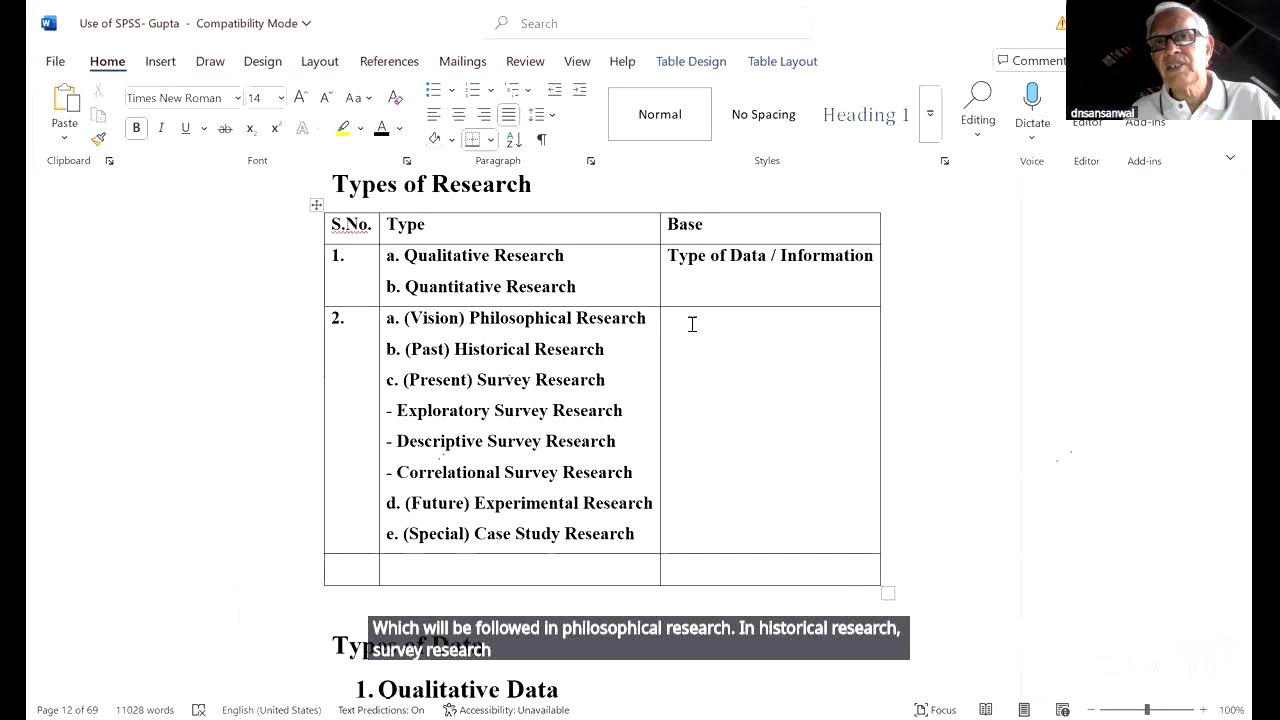TLDR;
This YouTube video features a lecture by Dr. DN Sanswal on research methodology. The lecture covers fundamental concepts such as defining research, understanding variables, and differentiating between types of research based on data, methodology, and purpose. Dr. Sanswal engages with the audience through questions and provides detailed explanations, aiming to clarify common misconceptions and build a solid foundation for conducting effective research.
- Definition of research and its components
- Types of research based on data and methodology
- Importance of systematic approach in research
Introduction and Welcome [0:47]
Dr. Vipin Singh welcomes participants to the second day of a refresher course on research methodology. He introduces Dr. DN Sanswal, a retired head and dean from Devi Ahilya University, Indore, highlighting his extensive background in research methodology, statistics, and educational technology. Dr. Sanswal's credentials include teaching at the Indian Institute of Management Indore and the Indian Institute of Foreign Trade, New Delhi, along with numerous publications and workshops on research methodology and SPSS.
Initial Questions and Interaction [3:34]
Dr. Sanswal begins by posing questions to the audience to assess their understanding of fundamental concepts. The first question focuses on identifying variables, while the second explores the steps involved in research. Participants are asked to respond via the chat box. Due to disruptions from participants marking on the screen, Dr. Sanswal expresses his frustration and briefly pauses the session.
Answers to Initial Questions [10:04]
Dr. Sanswal provides the correct answers to the initial questions. For the first question on variables, he clarifies that content of research methodology, social problems, haemoglobin, anxiety, achievement in physics, teaching experience, types of university, cost of fruits, subjects, reading comprehension, types of pollution, and blood count are variables. He explains why certain options, such as "urban teacher" or "discussion method," are not variables unless presented in a comparative context (e.g., types of schools, methods of teaching). For the second question, he identifies the correct steps of research as identification of problem, data collection, data analysis and conclusion.
Defining Research [18:52]
Dr. Sanswal breaks down the word "research" into "re" (again) and "search." He explains that research is necessary when we seek something we don't have. Using the example of the COVID-19 pandemic, he illustrates how scientists conducted experiments to find solutions to the virus. He emphasises that research involves systematic activities and a structured process to solve a problem. He defines research as a process where activities are carried out systematically or scientifically to find a solution to a problem.
Subject-Specific Definitions of Research [30:59]
Dr. Sanswal explains how the general definition of research can be modified to fit specific subjects such as English, chemistry, mathematics, Sanskrit, library science, and education. For example, research in English refers to a process wherein activities are carried out systematically to find solutions to problems related to some aspect of English. He tailors the definition for each subject, using "systematically" for social sciences and "scientifically" for sciences.
Characteristics of Research [42:45]
Dr. Sanswal outlines the key characteristics of research, which remain consistent across all subjects. These characteristics include: research refers to a problem, involves activities, is systematic or scientific, is a process, and leads to a solution. He uses the example of vaccine development during the pandemic to illustrate that each research effort aims for one specific solution.
Discovery vs. Invention [48:51]
Dr. Sanswal asks the audience to differentiate between discovery and invention. He explains that discovery involves finding something that already exists on the planet, while invention involves creating something new.
Types of Research Based on Data [51:48]
Dr. Sanswal discusses the types of data and clarifies that primary and secondary are sources of data, not types. He identifies the two main types of data as qualitative and quantitative. Qualitative research involves collecting and analysing non-numerical data, while quantitative research involves numerical data. He advises researchers to avoid converting qualitative data into quantitative data to prevent loss of information.
Types of Research Based on Methodology [1:09:08]
Dr. Sanswal explains different types of research based on methodology: philosophical, historical, survey, correlational, experimental, and case study. Philosophical research explores ideas and visions, historical research studies past events, survey research gathers data from a population, correlational research examines relationships between variables, experimental research tests cause-and-effect relationships, and case study research investigates specific instances or cases. He provides examples to illustrate each type, such as studying Mahatma Gandhi's philosophy for philosophical research or conducting surveys to understand available accommodations.
Types of Research: Theoretical, Experimental, and Action Research [1:30:03]
Dr. Sanswal introduces another classification of research: theoretical (or basic/fundamental), experimental (or applied), and action research. Theoretical research is qualitative, experimental research is quantitative, and action research is also quantitative. He notes that qualitative and quantitative characteristics cut across all types of research, but the classification depends on the base (type of data, methodology, or purpose).









